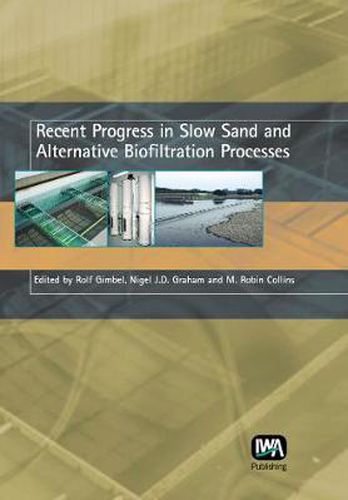Readings Newsletter
Become a Readings Member to make your shopping experience even easier.
Sign in or sign up for free!
You’re not far away from qualifying for FREE standard shipping within Australia
You’ve qualified for FREE standard shipping within Australia
The cart is loading…






Slow sand filtration is typically cited as being the first engineered process in drinking-water treatment. Proven modifications to the conventional slow sand filtration process, the awareness of induced biological activity in riverbank filtration systems, and the growth of oxidant-induced biological removals in more rapid-rate filters (e.g. biological activated carbon) demonstrate the renaissance of biofiltration as a treatment process that remains viable for both small, rural communities and major cities. Biofiltration is expected to become even more common in the future as efforts intensify to decrease the presence of disease-causing microorganisms and disinfection by-products in drinking water, to minimize microbial regrowth potential in distribution systems, and where operator skill levels are emphasized. Recent Progress in Slow Sand and Alternative Biofiltration Processes provides a state-of-the-art assessment on a variety of biofiltration systems from studies conducted around the world. The authors collectively represent a perspective from 23 countries and include academics, biofiltration system users, designers, and manufacturers. It provides an up-to-date perspective on the physical, chemical, biological, and operational factors affecting the performance of slow sand filtration (SSF), riverbank filtration (RBF), soil-aquifer treatment (SAT), and biological activated carbon (BAC) processes. The main themes are: comparable overviews of biofiltration systems; slow sand filtration process behavior, treatment performance and process developments; and alternative biofiltration process behaviors, treatment performances, and process developments.
$9.00 standard shipping within Australia
FREE standard shipping within Australia for orders over $100.00
Express & International shipping calculated at checkout
Slow sand filtration is typically cited as being the first engineered process in drinking-water treatment. Proven modifications to the conventional slow sand filtration process, the awareness of induced biological activity in riverbank filtration systems, and the growth of oxidant-induced biological removals in more rapid-rate filters (e.g. biological activated carbon) demonstrate the renaissance of biofiltration as a treatment process that remains viable for both small, rural communities and major cities. Biofiltration is expected to become even more common in the future as efforts intensify to decrease the presence of disease-causing microorganisms and disinfection by-products in drinking water, to minimize microbial regrowth potential in distribution systems, and where operator skill levels are emphasized. Recent Progress in Slow Sand and Alternative Biofiltration Processes provides a state-of-the-art assessment on a variety of biofiltration systems from studies conducted around the world. The authors collectively represent a perspective from 23 countries and include academics, biofiltration system users, designers, and manufacturers. It provides an up-to-date perspective on the physical, chemical, biological, and operational factors affecting the performance of slow sand filtration (SSF), riverbank filtration (RBF), soil-aquifer treatment (SAT), and biological activated carbon (BAC) processes. The main themes are: comparable overviews of biofiltration systems; slow sand filtration process behavior, treatment performance and process developments; and alternative biofiltration process behaviors, treatment performances, and process developments.